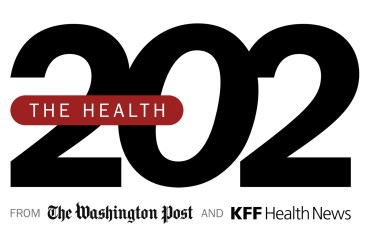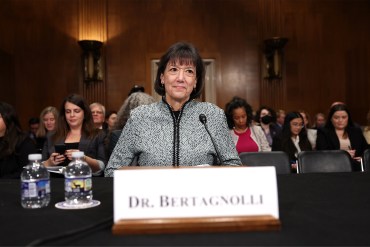Cómo impactaría una segunda presidencia de Trump en la atención de salud
Intentar pronosticar las prioridades de Trump en un segundo mandato es aún más difícil ya que cambia frecuentemente de posición sobre los temas, y lo hace muchas veces.
The AMA Wants a Medicare Cut Reversed – And Lawmakers To Stay Out of Care
Congress is back this week and feverishly working on a bipartisan agreement to fund the government for the rest of the 2024 fiscal year. Ahead of a potential vote, I spoke with Jesse Ehrenfeld, the president of the American Medical Association, the nation’s largest lobby group for doctors, about his organization’s priorities in Washington. Some […]
Hay una nueva variante de covid-19 y aumentan los casos. Lo que necesitas saber
A nivel nacional, se ha registrado un marcado aumento en las visitas a salas de emergencia y hospitalizaciones por covid-19, influenza y el virus respiratorio sincitial.
There’s a New Covid-19 Variant and Cases Are Ticking Up. What Do You Need to Know?
The covid-19 virus is continually changing, and a recent subvariant, the JN.1, is rapidly climbing the charts.
RFK Jr.’s Campaign of Conspiracy Theories Is PolitiFact’s 2023 Lie of the Year
Debate and speculation are heating up over whether Robert F. Kennedy Jr.’s presidential campaign will factor into the outcome of the 2024 election. But one thing is clear: Kennedy’s political following is built on a movement that seeks to legitimize conspiracy theories.
Rift Over When to Use N95s Puts Health Workers at Risk Again
The Centers for Disease Control and Prevention is considering fuzzy guidelines on infection control in hospitals, critics say, leaving employers free to cut corners on N95 masks and other protective measures.
Republicans Once Championed Public Health. What Happened?
It wasn’t that long ago that Republicans were all-in on boosting public health spending. “The highest investment priority in Washington should be to double the federal budget for scientific research,” former House Speaker Newt Gingrich (R-Ga.) wrote in a 1999 op-ed in The Washington Post. Big spending increases for the National Institutes of Health soon […]
Explosive DeSantis-Newsom Debate Reflects Nation’s Culture Wars
The two governors exchanged heated verbal barbs when they faced off in a wide-ranging debate that covered various health-related topics, from abortion to gun violence.
DeSantis, Newsom to Tangle Over Hot-Button Health Issues
Florida’s Republican presidential hopeful, Ron DeSantis,and Democratic firebrand Gavin Newsom of California square off today in a contest of governors that can best be described as the debate to determine ¿quién es más macho? — who is more manly — about protecting your freedoms. Both men have led their respective states since 2019, and they’ve […]
GOP Presidential Hopefuls Use Trump’s Covid Record to Court Vaccine Skeptics
Candidates see former President Donald Trump’s embrace of his administration’s covid-19 vaccine policies as an opportunity to gain ground. So far, their efforts haven’t found traction.
Estrategia de Trump y sus adversarios de campaña: desinformar sobre las vacunas contra covid
La dinámica resultante podría impactar más allá del ciclo electoral, y afectar la política de salud pública en los próximos años. Y afectar a otras importantes vacunas.
What Would a DeSantis Presidency Look Like for Health Care?
Ron DeSantis’ record as Florida governor provides some clues to how he would change the health care landscape if elected president. In his five years as governor, DeSantis has promoted stricter abortion rules and emphasized individual freedom over the benefits of public health.
Nikki Haley (And Her Opponents) Struggle With a Vaccine Message
Former South Carolina governor Nikki Haley portrays herself as a voice of reason in the Republican Party. “Let’s find consensus,” she said about abortion during the first GOP primary debate. “Let’s treat this like a respectful issue.” It’s talk like that — and strong polling in a hypothetical matchup against President Biden — that has […]
Is Novavax, the Latecomer Covid Vaccine, Worth the Wait?
People with special medical considerations are hoping the Novavax shot will bring fewer headaches, fevers, and less fatigue than have been reported by those taking mRNA vaccines.
Legisladores de Texas, Florida y otros estados socavan esfuerzos de vacunación contra covid
El cambio en la información sobre salud sigue la retórica de políticos, principalmente republicanos, que han dado marcha atrás en sus posturas sobre las vacunas de covid.
How Lawmakers in Texas and Florida Undermine Covid Vaccination Efforts
State legislatures and politicians are pressuring public health officials to keep quiet about covid vaccines.
¿Por qué sigue siendo tan difícil encontrar vacunas contra covid para niños pequeños?
Por primera vez desde el inicio de la pandemia, el gobierno federal no paga directamente a los fabricantes por las dosis de covid, un proceso que permitió a médicos y farmacéuticos recibir envíos de forma gratuita.
Why Is Finding Covid Shots for Young Children Still So Hard?
In Los Angeles and elsewhere, some parents are having trouble finding the new pediatric covid shot, especially for young children. Not all pediatricians or pharmacies have it and can administer it, even if vaccines.gov says they can.
Biden Pick to Lead NIH Finally Has Her Day, but Still Gets Caught Up in Drug Price Debate
Monica Bertagnolli, the president’s choice to head the National Institutes of Health, appeared before a Senate committee this week. Her confirmation has been held up by Sen. Bernie Sanders (I-Vt.), who has demanded President Joe Biden work more aggressively to lower prescription drug prices.
The New Vaccines and You: Americans Better Armed Than Ever Against the Winter Blechs
Flu, covid, and respiratory viruses kill thousands of Americans each year, but the latest batch of vaccines could save lives.



















